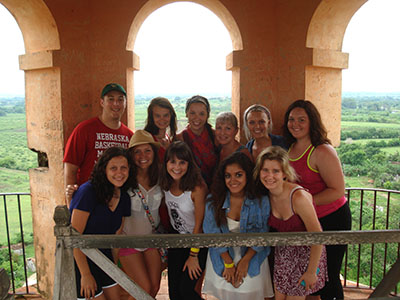
Cuba, a country unknown for advertising and public relations, was the most recent site for a College of Journalism and Mass Communications summer study abroad program. After visiting in January, Professor Phyllis Larsen partnered with CIEE Study Abroad and the Juan Marinello Institute for Cultural Research in Havana to organize an original experience for students and obtain educational visas. The summer course focused on discovering the use of advertising and media within Cuban society, as well as analyzing cultural questions first hand.
Ten students resided in casas particulares, or homestays, with Cuban families in Havana where host parents regularly prepared traditional Cuban cuisine for breakfast and dinner. Students ate lunch around the city including a favorite local restaurant that served Cuban pizza for about 50 cents. Within the three-week program, students navigated the city of 2.2 million with the help of four young Cuban professionals. They traveled on foot and by máqunias, classic American cars used as taxis. Daily interaction with Cuban citizens facilitated understanding of the culture and history as well as a greater knowledge of everyday life in Cuba. Guest speakers also increased students’ understanding of Cuba especially in relation to journalism and media.
Cuban professors and experts presented lectures on history, media, gender studies, and publicity. Fidel Rodriguez, professor of communications at the University of Havana presented a lesson on media and advertising in Cuba. Rodriguez explained Cuba’s use of advertisements as an educational tool, as well as optimism of its use in the future. “This is the year of change,” Fidel stated. With the expanding economic landscape, advertising and promotion are becoming more significant in Cuba, creating an opportune occasion for study. Students were encouraged to discuss previous perceptions and question new information in order to understand how media influences Cuban communities.
In order to put the course content into context, students needed an understanding of history and culture. Among countless memorable experiences, a favorite was salsa dance lessons. Students enjoyed a private class to learn the basics of the Cuban salsa, which requires rhythm and of course hip movement. Students were able to practice their new moves at a salsa club while interacting with local young people. They visited the historically important region of Matanzas, site of the Bay of Pigs, and Trinidad, a restored colonial township. The group also had the opportunity to attend a Cuban film screening, which contained an in-depth discussion with one of Cuba’s leading directors Fernando Perez and actress Laura de la Uz. Other highlights included an ethnographic cooking class, where students learned to make traditional Cuban pork, congrí (rice baked with black beans), tostones (fried plantains), and flan, as well as exploring the malecón (boardwalk) of Havana, which is a popular hangout for locals.
Students faced challenges adjusting to the Cuban way of life. Mastering the use of two different currencies, the Cuban convertible peso (CUC) and the Cuban peso (CUP), proved to be difficult, as was understanding the locals’ fast-paced Spanish. However, the most trying aspect was the lack of communication with loved ones. Ryann Lynn, a senior advertising and public relations major, said, “The inability to contact and connect with people from home affected me more than I originally assumed.” Although the lack of Facebook and Twitter was a struggle for some, being unable to tell family and friends about adventures and newfound knowledge through a text or phone call remained the most challenging adjustment.
Though the group was abroad for just three weeks, the impact of Cuban culture changed outlooks and attitudes. From lectures and time spent with local people, students realized more similarities exist between our two countries than originally believed. As students return and transition back to life in the United States, they are called to be ambassadors for Cuba, in order to inform friends and family of misconceptions and dated beliefs of the country that lies only 90 miles off the coast of Key West. Senior advertising and public relations major, Rebecca DeNell affirmed, “It was a life changing experience that expanded my mindset of how big and beautiful the world is. Few people will receive an opportunity to travel to Cuba during such a revolutionary time.”
by Megan Simonsen
More details at: http://unlcojmc.tumblr.com/